Working in the shop with cancer
Diagnosis and treatment don't mean your shop days are over, but you do have to make some changes.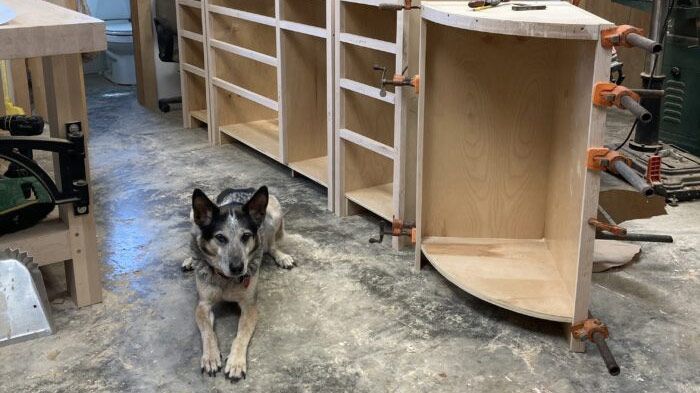
When my doctor called on November 15, 2020, with news that a recent CT scan suggested that I probably had pancreatic cancer, I had no idea how much longer I would be able to work in my shop. My preliminary meeting with a pancreatic oncologist convinced me that I should start chemo treatment as soon as possible, though setting me up with our hospital’s infusion center and having additional tests to confirm the diagnosis took a few weeks.
I used those weeks to wrap up a few jobs in my shop and install them in clients’ homes. By the time I was done, I found myself wondering whether they might be my last commissions. Everything I’d heard about the side effects of chemo had me imagining the worst, but things have turned out far better than I expected. In case it may be helpful to others facing similar circumstances, here is how I have dealt with my situation to date.
Allow yourself time to learn how treatments are going to affect you
The first round of chemo was brutal, but the seven since then have caused relatively minimal side effects. (I still have four more rounds, over the course of two months.) I decided to postpone my return to the shop until I was good and familiar with the side effects, some of which would make the kind of work I do more dangerous than usual.
In my case, the most notable side effects have been these:
- Peripheral neuropathy, a feeling of pins and needles, primarily in response to cold. Four months in, I know that this side effect abates within a few days of the infusion. It’s caused by oxaliplatin, one of the drugs in my regimen; in addition to pins and needles, which can be severe, I have the occasional cramp that causes one or both of my thumbs to pull in towards my fingers.
Most of the tools and equipment in my shop are made of steel, which is cool to the touch even in summer. I thought that my impaired ability to feel things, especially where fine adjustments are necessary, made working in the shop too dangerous—not only for my personal safety, but for the sake of whatever I was working on.
- Potentially dangerous gear associated with chemo. For the first 46 hours after my infusions, I have a portable pump attached by a catheter to a needle that sticks out horizontally from my chest. The line is subject to getting grabbed or tangled up in any large materials I’m handling, and the 5-FU (Fluorouracil) is not something I want to leak on my skin, my clothes, or even my shop floor, as it’s highly toxic.
- “Chemo brain.” Now I know what others were referring to as chemo brain or chemo fog. I have been lucky to experience this only twice; I felt spacey – in itself, not an unpleasant sensation, but I know better than to work with machines (or drive) when in that state. I don’t even want to work on drawings when in that state; I’m afraid I might miss a critical detail or measurement, something that’s easy to do even when firing on all cylinders. So on those days I indulged myself in writing my current book, Shop Tails, for Lost Art Press.
- Muscle fatigue. My hemoglobin level is low due to chemo, which makes it harder to get oxygen to my muscles when I’m working at my previously normal pace. So I take more care to pace myself, as well as when lifting and carrying unwieldy or heavy objects.
- Risk of infection. Chemotherapy can cause dangerous drops in white blood cell and other blood counts, compromising your immune response. In my case, it has also drastically reduced my platelet level, which makes it harder for blood to clot if I get cut. In view of this risk, I have taken to wearing work gloves when handling sheets of plywood or large boards of solid roughsawn lumber. When I do get cuts or splinters, I wash the wound, then apply antibiotic first aid ointment and a bandage. So far, so good.
- Risk of bleeding. Because pancreatic cancer can cause blood clots, my oncologist has me on Eliquis, a blood thinner. The same measures I take to lower my risk of infection are my m.o. for minimizing this risk.
- A not-great feeling in my stomach, between extra acid production in response to some of the chemo drugs. This sub-par feeling would not in itself keep me from the shop, but it’s certainly unpleasant.
- Exhaustion is another common side effect of chemotherapy, but so far I have been spared.
Pace yourself
After five rounds of chemo, I was feeling so strong and energetic (despite the low hemoglobin) that I decided I was up for taking on a job in the shop. It sucks to say no to as much prospective work as I have turned down in the past few months, but the stress of knowing clients had expectations of me was too great; I’ve done everything I can to minimize stress, which some claim depresses the immune system and can even help create the conditions that allow cancer to develop. My current job is a small kitchen for a century-old bungalow – not too large a scope of work, and I really wanted to take on the building of the cabinets in addition to the design, to make sure the cabinets would be built as I had drawn them, with every period detail intact.
I have worked out a basic plan according to which I spend most of my chemo weeks on kitchen design jobs and writing, then spend the alternate weeks in the shop. I am fortunate to have paid writing work, in addition to kitchen design jobs, so I still have income, even when I’m not working in the shop.
Be open with your clients and suppliers
I have been upfront with everyone about my health situation. Not only do I believe it helps everyone when those facing challenges are honest about their situation; for practical reasons, including managing my clients’ and suppliers’ expectations, I also want people to know their job will likely take longer due to my week-on/week-off schedule in the shop right now. Clients have been wonderfully patient and understanding. Do some people infer from my diagnosis that I’m done with woodworking? No doubt. But there are ways to minimize the damage to your business, by continuing to post—honestly—on social media sites and blogs about the work you’re doing in spite of cancer, in addition to word of mouth.
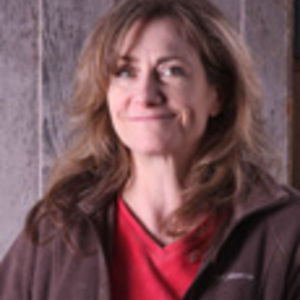
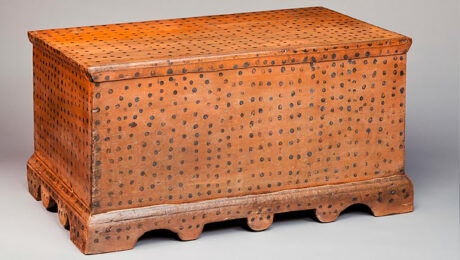
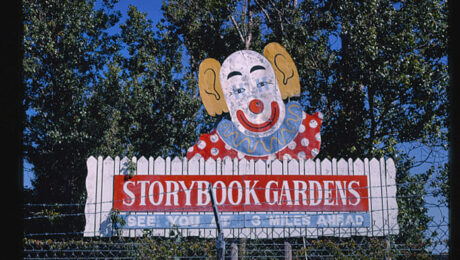

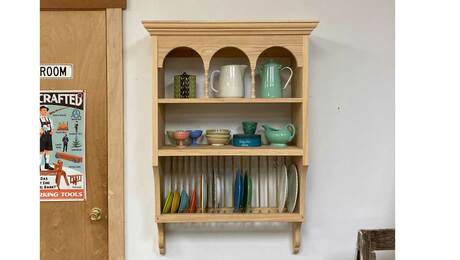

















Comments
Wonderful article, Nancy. Very timely as well. In March of 2019 I was diagnosed with CML, Chronic Myeloid Leukemia and started medication to slow down the effects of the disease. Meantime, my custom woodworking activity and interest took a nose dive. It took almost a year of adjusting meds and my lifestyle before returning to my commissioned woodworking business. It had always supplemented my limited income and paid for my new tools and vacations and frankly was a joy I missed. Designing custom furniture and restoration of heirlooms and antiques is most rewarding. My illness slows me down considerably and half hour breaks every two hours or so is my new norm. Also lack of strength has me calling my neighbors for help when needed. Business is booming and I turn down four to six jobs a week and have become very selective. My family is amazed by my work and most can't believe that I passed 80 and keep on trucking. My thoughts and prayers are with you. Thanks for sharing.
Here's hoping that you will have many more years of woodworking and enjoying all the other activities you love!
You are a wonderful and inspiring person; very brave to share your diagnosis with us.
Thanks. I don't think of this as brave. Being open about such things makes everyone's life easier. The more stigma we do away with, the better!
I had 24 chemo treatments (mainly Rituximab) six years ago. Now I'm on Ibrutinib (taken in pill form). I have the same weakened immune system and platelet count as you as a result of the meds. The Rituximab affected my eyesight but I can see with prescription glasses. The COVID-19 vaccine (I've already had both shots) may not be effective because of low antibody counts caused by meds. They will know soon how soon we will need boosters because of immuno-deficiency.
Yes, I, too had both Covid shots, only to read an article in the New York Times (two weeks ago this-coming Sunday) about the possibility that those with suppressed immune systems may not make the antibodies necessary for immunity. Ugh..... I called our county health department to ask whether there is any way to find out whether one's body has produced those antibodies, and they said the CDC is not recommending an antibody test; instead, they recommend that we continue to act as though we aren't vaccinated. Doing so, of course, requires a similar effort to be made by others around us, considering that the vaccine is not 100% effective and even those who are immune can still transmit the virus in principle. That makes things tough if you work or want to spend time with people who consider themselves safe to be around and aren't willing to wear a mask.
Getting back in the shop after a stroke gave me something to look forward to
Very Good Article. I am an amateur woodworker and still working full time. I was diagnosed with a very rare cancer, clear cell sarcoma, in August of 2013. I have learned a lot through the chemo, Oral medications that are more toxic than chemo, surgeries, radiation, immuno therapy and various phase 1 trials. There is 1 common thread, the fatigue from the drugs and the fight. Pacing yourself is very important. I ended up putting a chair in my shop and just sit down for 15minutes or so from time tot time.
The most important thing I learned though came from a stage 4 breast cancer patient. Remember you are not the disease and the disease does not define you. There are many more important things that define who you are. In my case I have my Grand children,, my family, my woodworking, music and my job that are all more important than the cancer. Yes the cancer take a lot of time and one day may beat me, but until then there are more important things in my life.
Good luck and keep fighting the good fight.
Thank you for allowing us to journey with you and your family. I look forward to future posts, articles and books about life and woodworking after chemo.
Excellent article Nancy! Keeping you in my thoughts!
Thank you Nancy for sharing this. You will be in my prayers. So many people look at this as a death sentence. Your positive attitude will certainly help you in your recovery.
There's a certain camaraderie we have as cancer patients and this article was encouraging to read. Woodworking had always been therapeutic for me but cancer, and everything that comes with it, put a dark cloud over my head. Currently, going through immunotherapy and remnants of "chemo brain", so I work very deliberately and rest a lot more than I ever have. Thoughts and prayers are with you and all fellow woodworkers...thanks for sharing!
Thank you, Nancy, for sharing your ongoing story with us. It's encouraging to see you continue to do what you love; albeit at a different pace than you have in the past. You are an inspiration.
Log in or create an account to post a comment.
Sign up Log in